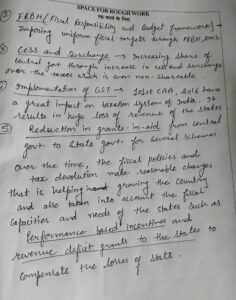In case of recession, why are most companies laying off many of their employees?
The "Make in India" initiative aims to transform India into a global manufacturing hub by encouraging both domestic and foreign companies to invest in the country. The prospects for India’s manufacturing sector under this initiative are promising. Firstly, the initiative seeks to increase the manufaRead more



During a recession, companies lay off employees primarily to manage costs and ensure survival. Revenue drops as consumer spending decreases, prompting businesses to reduce expenses, and labor is one of the largest costs. Layoffs help immediately cut payroll expenses and preserve cash flow, which isRead more
During a recession, companies lay off employees primarily to manage costs and ensure survival. Revenue drops as consumer spending decreases, prompting businesses to reduce expenses, and labor is one of the largest costs. Layoffs help immediately cut payroll expenses and preserve cash flow, which is crucial during economic uncertainty.
With lower demand for products and services, companies need fewer employees. Aligning the workforce with reduced demand helps maintain operational efficiency. Additionally, recessions often trigger restructuring efforts to streamline operations and eliminate redundancies, further driving layoffs.
Publicly traded companies face investor pressure to maintain profitability and protect stock prices. Layoffs signal decisive cost management, reassuring investors about the company’s financial health. For some businesses, layoffs are essential to avoid bankruptcy, ensuring they can continue operations during the downturn.
While layoffs are common, they can harm employee morale, company reputation, and long-term performance. Some companies explore alternatives like reducing executive salaries, cutting non-essential expenses, or implementing temporary furloughs to mitigate these impacts. Ultimately, layoffs are a strategic move to balance immediate cost reduction with the goal of emerging stronger post-recession.
See less